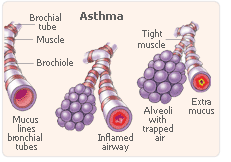
Five percent of the United States population is affected by asthma and this number continues to rise each year. Six billion dollars was spent in medical expenditures related to asthma in 1990 alone. Obesity is also a huge problem in the United States. Even though both conditions are serious issues there are few studies on the relationship between obesity and asthma. Even less is known about obesity and the relationship between the onset of adult asthma. Fortunately in more recent years investigations have begun to learn more about risk factors and hormones in the attempts to prevent even more cases of asthma from developing.
Asthma is a condition that affects the lungs. It causes the muscles around the airways to constrict. They become inflamed and swell causing irritation in the airways. When the airways narrow it causes symptoms such as coughing, wheezing, chest tightness and shortness of breath. If asthma is left untreated it can cause in long-term loss of lung function.
Because asthma makes it hard to breath it is also hard for individuals who have asthma to take part in physically challenging activities. Because of activity limitations individuals with asthma might experience a weight change.

A study was performed on female registered nurses in the Nurses' Health Study. This study was created to examine the relationship of lifestyle and diet, hormone use and weight change in occurrence with breast cancer and other illnesses. Using information from 85,911 participants between the ages of 26 to 46 years the outcome of physician-diagnosed asthma and recent use of an asthma medication was measured. Participants completed out questionnaires asking about age, race, current height and weight, weight at age 18, physical activity, smoking status, diet and medical history. During the 2 year follow up members were asked to report their waist-hip ratio by measuring the largest circumference around their hips and waist while standing up.
The reportings showed that older women tended to have higher body mass index, to partake in less physical activity and larger energy intake. The obese women at baseline usually weighed more at 18 years old and gained more weight during the ensuing years. This weight change had a large effect on the development of adult onset asthma. Women who lost weight after 18 years of age were at a slightly lesser risk of developing adult asthma. High body mass index also attributed to the onset of adult asthma.
These results suggest that obesity may be the reason for the current asthma epidemic in the United States.